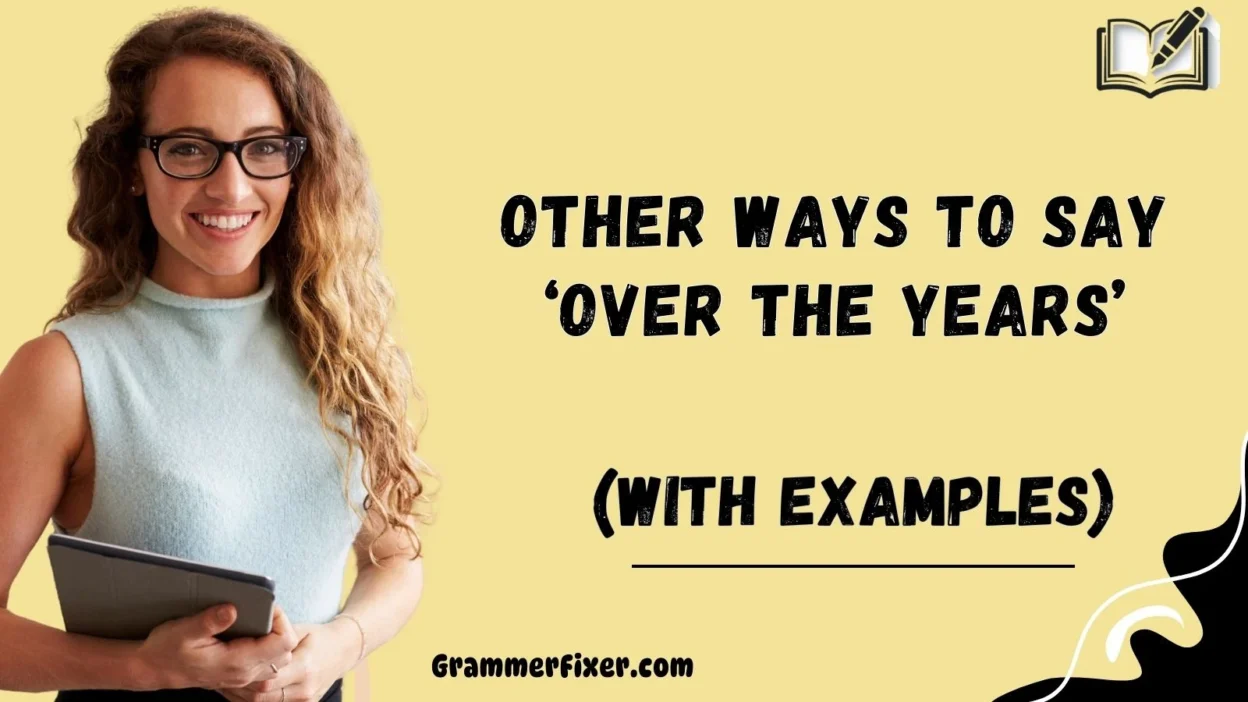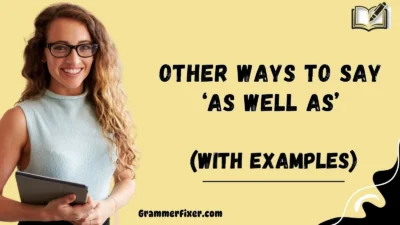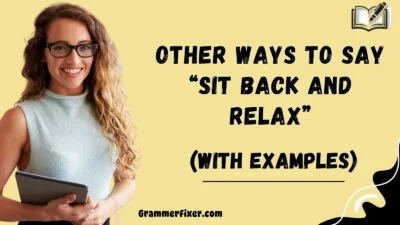Finding the right words can make your message feel more personal, warm, and meaningful. While phrases like “Over the Years” are familiar and widely used, sometimes we want to say things in a way that feels fresher, more heartfelt, or more professional, depending on the situation.
Whether you’re reminiscing cherished memories, highlighting growth, or reflecting on life’s journey, these alternatives will help you communicate with care, thoughtfulness, and emotional depth.
What Does “Over the Years” Mean?
The phrase “Over the Years” refers to a long period of time in which events, changes, or growth gradually occurred. It suggests a progression, development, or unfolding of experiences across the duration of many years.
When to Use “Over the Years”?
You can use “Over the Years” when:
- Reflecting on personal or professional experiences.
- Sharing milestones or memories.
- Highlighting changes, growth, or evolution over time.
- Writing in a casual, conversational, or reflective tone.
Is It Professional/Polite to Say “Over the Years”?
Yes — it’s both professional and polite. The phrase works well in:
- Business communication (“Over the years, our company has grown significantly”).
- Personal conversations (“Over the years, our friendship has become stronger”).
- Storytelling or presentations when reflecting on progress.
Pros or Cons of Saying “Over the Years”
Pros:
- Versatile (works in casual, formal, or reflective contexts).
- Widely understood and clear.
- Evokes nostalgia and continuity.
Cons:
- Can feel generic or overused.
- Sometimes lacks emotional depth.
- May sound too repetitive in formal writing.
1. Throughout the Years
Meaning: A phrase emphasizing the continuous span of years.
Explanation: Suggests consistency and endurance across time.
Example: “Throughout the years, our bond has only grown stronger.”
Best Use: Reflecting on long-lasting relationships or achievements.
Worst Use: In very short-term contexts (e.g., “throughout the years” for a project that lasted 6 months).
Tone: Warm, reflective, steady.
2. Across the Years
Meaning: Implies events that occurred at different points in time.
Explanation: Highlights scattered or memorable moments.
Example: “Across the years, I’ve learned to appreciate the little things in life.”
Best Use: Reflective writing, storytelling.
Worst Use: Technical reports (can feel too poetic).
Tone: Nostalgic, thoughtful.
3. Over Time
Meaning: Indicates gradual change or development.
Explanation: Suggests steady progress or transformation.
Example: “Over time, she developed incredible confidence in her craft.”
Best Use: Growth, personal development, or gradual change.
Worst Use: Historical events that occurred suddenly.
Tone: Neutral, adaptable.
4. As the Years Passed
Meaning: Refers to the movement of time.
Explanation: Evokes a sense of passing moments and life unfolding.
Example: “As the years passed, their friendship only deepened.”
Best Use: Sentimental reflections.
Worst Use: Academic or technical contexts.
Tone: Emotional, narrative.
5. With the Passing Years
Meaning: A gentle acknowledgment of time’s passage.
Explanation: Adds a poetic touch to reflections.
Example: “With the passing years, wisdom quietly found its way into his life.”
Best Use: Poetic writing, personal messages.
Worst Use: Formal or business contexts.
Tone: Sentimental, poetic.
6. Through the Passage of Time
Meaning: Highlights the flow and continuity of time.
Explanation: More formal and reflective, suited for thoughtful writing.
Example: “Through the passage of time, civilizations have risen and fallen.”
Best Use: Historical or philosophical contexts.
Worst Use: Casual text messages.
Tone: Formal, contemplative.
7. Over the Course of Time
Meaning: Emphasizes the entire span of events.
Explanation: Reflects on development and progress.
Example: “Over the course of time, their teamwork became effortless.”
Best Use: Business, professional writing.
Worst Use: Short, casual chats.
Tone: Professional, precise.
8. In the Passing of Years
Meaning: Suggests a quiet acknowledgment of time moving.
Explanation: Often carries a nostalgic or reflective tone.
Example: “In the passing of years, he matured into a wise leader.”
Best Use: Personal reflections.
Worst Use: Data-driven reports.
Tone: Gentle, reflective.
9. During the Years
Meaning: Refers to what occurred within a time span.
Explanation: A simpler variation that’s more neutral.
Example: “During the years we worked together, I learned so much.”
Best Use: Neutral, conversational contexts.
Worst Use: Poetic or literary writing (can feel flat).
Tone: Straightforward, conversational.
10. Over Many Years
Meaning: Emphasizes duration and length.
Explanation: Suggests something took a long time to build or achieve.
Example: “Over many years, they created a legacy of excellence.”
Best Use: Professional achievements, history.
Worst Use: Short timeframes.
Tone: Respectful, formal.
11. Through the Decades
Meaning: Refers to events or changes spread across ten-year spans.
Explanation: Adds a sense of historical depth and endurance.
Example: “Through the decades, music has evolved to reflect society’s changes.”
Best Use: Historical, cultural, or generational contexts.
Worst Use: Short-term experiences.
Tone: Historical, authoritative.
12. Over the Generations
Meaning: Reflects changes or continuity across multiple family or social lines.
Explanation: Highlights heritage, tradition, or legacy.
Example: “Over the generations, our family has kept this tradition alive.”
Best Use: Family stories, cultural contexts.
Worst Use: Business reports or short-term achievements.
Tone: Warm, legacy-focused.
13. Across the Ages
Meaning: A grand expression of long stretches of time.
Explanation: Often used in literary or poetic writing.
Example: “Across the ages, humanity has sought meaning in the stars.”
Best Use: Poetic, reflective, or historical storytelling.
Worst Use: Day-to-day casual conversations.
Tone: Poetic, sweeping.
14. Over the Span of Years
Meaning: Suggests a measured duration of time.
Explanation: Useful when emphasizing progress within a set period.
Example: “Over the span of years, she mastered her craft.”
Best Use: Professional growth, achievements.
Worst Use: Casual, short remarks.
Tone: Formal, reflective.
15. Through the Lifetime
Meaning: Focuses on the entire life experience of a person.
Explanation: Evokes personal milestones, endurance, or transformation.
Example: “Through the lifetime of their marriage, they overcame many challenges.”
Best Use: Deep personal reflections, life stories.
Worst Use: Very short-term events.
Tone: Sentimental, profound.
16. Over the Course of the Years
Meaning: A slightly formal variation of “over the years.”
Explanation: Adds a touch of precision and flow.
Example: “Over the course of the years, the company expanded internationally.”
Best Use: Professional writing, business contexts.
Worst Use: Poetic or casual notes (can sound stiff).
Tone: Professional, structured.
17. As Time Went By
Meaning: Captures the natural flow of time.
Explanation: Commonly used in storytelling and personal reflections.
Example: “As time went by, he realized the value of patience.”
Best Use: Storytelling, reflective conversations.
Worst Use: Strictly academic or technical writing.
Tone: Nostalgic, conversational.
18. As the Years Went By
Meaning: A direct reflection of years passing with impact.
Explanation: Similar to “as time went by,” but with more focus on years.
Example: “As the years went by, she grew wiser and more compassionate.”
Best Use: Emotional, reflective contexts.
Worst Use: Brief formal notes.
Tone: Emotional, warm.
19. Through the History
Meaning: Anchors experiences or events in historical context.
Explanation: Suggests perspective across time and records.
Example: “Through the history of science, discoveries have reshaped our world.”
Best Use: Educational, historical, or academic content.
Worst Use: Personal conversations (feels too distant).
Tone: Formal, academic.
20. In the Wake of Time
Meaning: Suggests consequences and changes shaped by passing years.
Explanation: Adds a dramatic or reflective flair.
Example: “In the wake of time, traditions fade but memories endure.”
Best Use: Poetic writing, dramatic speeches.
Worst Use: Straightforward, business-like contexts.
Tone: Dramatic, reflective.
21. With Time
Meaning: Refers to the effect of time on growth, healing, or change.
Explanation: Suggests progress, patience, or inevitable transformation.
Example: “With time, their efforts blossomed into success.”
Best Use: Encouraging growth, patience, or perseverance.
Worst Use: Historical accounts (too vague).
Tone: Encouraging, reflective.
22. As Time Progressed
Meaning: Indicates forward movement of time.
Explanation: Emphasizes progress, development, and unfolding events.
Example: “As time progressed, the city transformed into a bustling hub.”
Best Use: Neutral or professional reflections.
Worst Use: Deeply poetic writing.
Tone: Neutral, steady.
23. In the Course of Years
Meaning: Highlights a specific timeframe or journey.
Explanation: Formal but adaptable phrase for structured writing.
Example: “In the course of years, their small team became a global brand.”
Best Use: Professional, historical, or business contexts.
Worst Use: Casual emails or notes.
Tone: Formal, polished.
24. As the Years Rolled By
Meaning: A casual and flowing way to reflect on time.
Explanation: Suggests ease, relaxation, or natural unfolding.
Example: “As the years rolled by, their friendship grew more meaningful.”
Best Use: Conversational, personal storytelling.
Worst Use: Business communication.
Tone: Casual, relaxed.
25. Through the Mists of Time
Meaning: Evokes mystery and hazy, distant memories.
Explanation: A poetic way to describe ancient or forgotten times.
Example: “Through the mists of time, legends continue to inspire us.”
Best Use: Literary writing, storytelling.
Worst Use: Formal or technical reports.
Tone: Poetic, mysterious.
26. Over the Centuries
Meaning: A very long-term expression.
Explanation: Useful when describing grand eras or civilizations.
Example: “Over the centuries, languages have evolved and blended.”
Best Use: Historical, cultural, or academic writing.
Worst Use: Personal reflections (too distant).
Tone: Grand, historical.
27. Over the Eras
Meaning: Similar to centuries, but more flexible and sweeping.
Explanation: Often used in artistic or cultural contexts.
Example: “Over the eras, art has reflected humanity’s struggles and triumphs.”
Best Use: History, art, culture.
Worst Use: Small-scale personal stories.
Tone: Artistic, reflective.
28. In Recent Years
Meaning: Focuses on the near past.
Explanation: Best used to highlight modern or current changes.
Example: “In recent years, technology has reshaped communication.”
Best Use: Current events, updates, modern discussions.
Worst Use: Ancient history or lifelong reflections.
Tone: Timely, relevant.
29. Through the Passing of Time
Meaning: A reflective acknowledgment of time’s natural flow.
Explanation: Adds poetic depth to messages about growth or endurance.
Example: “Through the passing of time, patience rewarded their efforts.”
Best Use: Poetic, personal, or reflective contexts.
Worst Use: Technical writing.
Tone: Poetic, gentle.
30. Over a Long Period
Meaning: A clear, simple description of time duration.
Explanation: Straightforward, emphasizing length without flair.
Example: “Over a long period, the project transformed into a movement.”
Best Use: Neutral, professional, academic.
Worst Use: Emotional, poetic messages.
Tone: Neutral, plain.
Conclusion
Finding alternatives to “Over the Years” is about more than just switching out words — it’s about capturing the right emotion, tone, and depth for your message. Each synonym we’ve explored adds its own flavor and personality: some sound professional and polished, others feel poetic and nostalgic, while a few are simply clear and neutral.
The best use of these alternatives is when you want to highlight growth, endurance, or meaningful changes that have unfolded with time. The worst use would be forcing them into contexts that don’t naturally fit — like using poetic phrases in technical reports or overly formal wording in casual notes.



